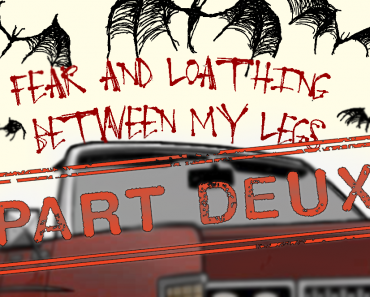Obamacare Vagina: Navigating Medicaid Coverage of SRS, Part One
By Rani Baker
@destroyed4com4t
I sat there, gently squooshing around silicone breast implant like a stress ball. Sqoosh, squoosh, feeling the weight of the rubbery tomato-shape in my hand. My surgeon was going over the results I could expect from this surgery. For starters, instead of the familiar round implant, I was going to have a firmer, teardrop-shaped implant. Among surgeons the implant has been given the nickname “Gummy Bear”; I was allowed to see and touch one of those as well. I felt the difference; the simultaneous rubbery firmness and gelatinous give. I was informed of drainage tubes, of calcification and rupture; seemingly Cronenbergian bioaugmentation complications that continue to populate my nightmares. I was told the surgery letters I had were not adequate for insurance, and that I needed both therapists to write new drafts specifically stating their recommendation for breast augmentation. The surgeon then brought out a digital camera, asked me to take off my clothes and stand against the far wall which had been painted a dark blue for a backdrop. “Just in case insurance wants them”, I was told.
“What exactly did I get myself into?” I thought.
“Well, why don’t we start from the beginning? Tell me about yourself.” the first therapist said. This was a little over a year ago, about seven months before my consultation for top surgery. Even getting into this first session was a bit of an adventure, starting from the moment I frantically opened a thread in a local trans support group asking for advice on how to “get surgery before we get a Republican president”. I’m not exactly wealthy and I’m terrible at crowdfunding and honestly thought sex-reassignment surgery was completely out of reach up until, well, literally until I had a surgery date.
Before the Oregon Health Plan had announced their impending compliance with Obamacare and WPATH transition medical care needs, I vividly recall attempting to gauge my possibilities of coverage through Aetna, my employer-provided insurance at the time. I knew folks who had their SRS partially covered by Portland State University’s insurance package through Aetna, and I’d hoped to have access to at least part of that coverage. Two years ago, I had made inquiry phone calls and at one point was literally laughed at by Aetna customer service. The service agent sardonically inquired whether I had “thought this through” and instead of sending me documentation on transgender medical care I received an email containing contact information for mental health services. So, I wasn’t exactly getting my hopes up.
But here I was a year later, with coverage and getting my first psychological evaluation. I remember at one point sighing and rolling my eyes in the middle of the initial interview, causing the therapist to ask me to clarify. I dunno, I replied, I always feel like talking about my childhood experiences with gender feel so “butterfly-logo internet forum” fodder. Childhood struggles with not fitting in, adolescent experiments with makeup. Small triumphs and tragedies not unlike many other transsexuals. Felt weird to trot it out in the real world, even in a clinical situation where it was entirely appropriate and necessary. The doctor was really frank and pleasant about the whole thing, which helped me open up.
Anyways, hi. My name is Rani. If I had been assigned female at birth my mom would have named me Dulcinea Merry-Lynn (a reference to her favorite film and book – Man From La Mancha and Lord Of The Rings) because she was a goddamn hippie. Instead, I was named after my dad, and it all went downhill from there. When every other boy my age in the 80s was obsessed with the Thundercats episode where Cheetarah was naked, my first childhood crush was on Shane Butterworth’s quite androgynous tortured weirdo character Lupus in the Bad News Bears television show. I had questions about my gender and sexuality that started before elementary school, but no way to explore or understand it. My childhood was highly religious and isolated, the latter due to that religious influence, bullying and living out in the middle of nowhere in 1980s Central Texas.
My parents divorced in my early teenage years, and we moved to a significantly less conservative military town. In high school, I became infamous as a gloomy artsy weirdo that painted my nails and wore makeup, and once I graduated high school and moved away to live on campus the first thing I bought with my dorm cafeteria paycheck was a (truly fucking hideous) dress. On my 20th birthday, I started writing the indie comic book Why I’m Not An Artist, later released by now-defunct Texas indie comic publisher Lucid Comics, which became increasingly dominated by musings about my gender angst. As soon as I was old enough to drink, I started attending a local drag bar (Harker Heights, Tx’s infamous Krossover Club), eventually becoming a performer. I attempted transition at 23, but was eventually pressured out of it by my at-the-time boyfriend and family. I wasn’t exactly finding a lot of support in the transsexual community of the time either, who looked down on me for tattoos, piercings, performing drag and other supposed unforgivables.
Anyway, that’s the path that led here, to a $200/hour therapy session in the Lloyd District. We had a half-dozen sessions to get to know each other; I had been up front that my goal working with him was ultimately to get an evaluation for surgery. He knew about my concerns and fears. My deepest fear was of losing my insurance coverage before I had a chance to get surgery; getting so close to the goal and then being cut off. He offered to help out as much as he could; after he deemed that he had enough to go on for an evaluation letter, he provided a recommendation for the second therapist. I had been accepted by OHP in June, I had my second letter at the end of September. I would eventually have sex-reassignment surgery the following August.
The letters themselves are fairly boilerplate, giving light background information and confirming I was capable of making an informed consent decision to pursue this surgery. My second letter has a line specifically stating a professional assessment that my gender dysphoria and desire to pursue transition are “not sexual in nature”, which I’m not sure was exactly necessary but feel will come in handy when internet jerks wanna try to diagnose me online.
With two psych letters, I then needed a physicians letter. I had scheduled an appointment with a local trans-friendly physician before realizing that I could have the doctor I had been seeing for hormone prescriptions to write one. Ultimately, scheduling both worked out advantageous because the other physician advised me on getting both top and bottom surgery covered. Up until this point I had only been counting on the latter happening. I asked about face surgery and was told that unfortunately, they had no coverage for such. He told me I had a very distinctive, attractive face anyways and I almost began to cry right there in his office. Based on recent changes and the impending arrival of a new surgeon later this year I will be checking in again about this in the near future.
Since embarking on this quest, I have taken note of other folks pursuing surgery this route, contacting them on social media and comparing notes and progress. Each new development, real and rumored, has been double-and-triple checked by me through various phone calls. Multiple receptionists and nurses know me by name at this point.
Consults with both top and bottom surgeons occurred very early this year. All the informality and playfulness of the top surgery consult contrasted with the more matter-of-fact demeanor of the bottom surgery consult. I was handed pamphlets of information to review, advised of the surgeon’s history and intended technique. I was told he wanted me to check in with a physical therapist for “floor muscle training”. I was advised that the surgeon was new to the procedure; ultimately I would turn out to be his 12th patient for sex-reassignment.
He volunteered that while he had no experience performing the surgery at the time, as a long-time urogenital surgeon he was proficient in many of the individual procedures that make up the surgery. He also mentioned practice work performed in the anatomy lab, and I just gotta take a second and remark on this because… well lemme just explain it.
In the anatomy lab, doctors work on corpses. People who donate their bodies to science. So you can just picture some academically-inclined liberal so-and-so, checking that box in their will, assuming their remains will be used to cure cancer or whatever and yet here they are getting post-mortem sex changes. For science.
I’m sorry, that’s kind of hilarious.
After consults, there was a bit of dead time because the insurance was dragging their feet about approving anything else. In the meantime, I needed to have hair removal performed on my genitals for surgery prep. Maddeningly, this was also not going to be covered by insurance. I went to a handful of sessions, out of pocket, to two different electrolysis technicians and was given an estimate of about 100 hours of work to clear it all off. At $75 an hour. Out of pocket. Over six to nine months.
This was the first time I thought I was done for. That was a lot of money to fork over and threw my entire timeline off. I decided to focus on needs for top surgery, something that seemed possible to do before I could potentially be kicked off insurance. That basically turned out to be daily phone calls to the surgeon’s office to check the status of the various letters and forms sent to my insurance and responses from the insurance to such. I also sent in the paperwork for amending my Texas birth certificate, which didn’t exactly look promising either. Things were getting dreary.
By the time I finally had a top surgery date, a breakthrough occurred for bottom surgery as well. The surgical dermatology wing had just begun offering laser hair removal treatments for surgery prep, covered by insurance. Yeah, I’d blown a few hundred dollars out of pocket for electrolysis by then, but this meant I had the potential of getting surgery in the fall. Back on schedule.
Top surgery itself was surprisingly straightforward. I showed up early in the morning, was checked in and directed to the hospital bed. I was introduced to the team as the IV was put in and the anesthesiologist asked me to decide what dream I wanted to have. As they put me under he asked me to describe the dream, and I talked about how I wanted to visit one of those floating hotels where the bedroom was underwater. I drifted off.
I don’t remember dreaming a goddamn thing.
I woke up really groggy that afternoon in a cartoonishly immense padded bra. They had me checked out and home by 6 pm. Or rather, I was at a friend’s apartment that was taking care of me. I had two JP drains, weird Harkonnen blood sacks attached to tubes underneath each armpit I had to empty and measure daily. I couldn’t wait to get rid of those things. When I did have them removed a week and a half later, I ruined my shirt and a hoodie because my right side would not stop bleeding. Like Jesus’s spear wound. For weeks after the drains removed, I had nightmares of rolling over them in my sleep bursting blood all over the sheets and bleeding out.
Meanwhile, I was slowly progressing on hair removal to the point where I could consult again with my surgeon and establish a surgery date. I was scheduled for a couple pre-op checkups and a physical therapy session. Most of the actual “physical therapy session” involved clenching and unclenching around the doctor’s finger in my butthole, which was unexpected. I thought I was gonna be doing yoga or something.
The physical therapist then brought out a dilator set and we reviewed how they worked. She talked about how if I become regularly sexually active that can take the place of dilation and we giggled about that.
She held up a purple dilator and was like “so if your boyfriend’s penis is about this size, on one hand, you may not feel the need to go larger” and I corrected her that he is more like the (slightly larger) blue one. She was then like “Well I’m not gonna tell you how to live your life but you may still wanna dilate with the (largest) green anyway. Ya know, just in case something else comes along. Be prepared.”
My doctor basically suggested I might wanna trade up on dick. She also kept remarking about how “young” I was and I kept thinking “ok that sounds fake but ok”
About a month since top surgery, I began to experience what the top surgeon described as the “softening of my implants. Swelling and pain had mostly subsided by that point. Feeling around, I could not (and still can’t) feel the difference between the breast tissue and the implant, which is pretty cool. Nipple sensation hadn’t quite returned to what it was, that would take a few more months, but it wasn’t bad.
While poking around the underboob scars, I began to feel what must have been the remaining internal stitching pop. They used some sort of internal suturing that my body was intended to eventually absorb (the outside of the surgical entry point was held together with surgical glue, which flaked off after a couple weeks). Anyway, the feeling was kinda gross but also kinda satisfying. Like three or four little “pops”.
Later that month, I went in to have laser hair removal on my genitals. Fourth session, every time as excruciating as it sounds. This time they put a numbing creme that was really intense. It wasn’t completely painless, but significantly less so.
Thing is, once I was done, my genitals and perineum were still super numb. Like, it genuinely felt like there is a gap between my legs. My brain keeps telling me “hmm, this is probably what it’s gonna be like after surgery”. Ya know, how its gonna feel without a penis or whatever. Just making a note of that because I guess I’ll be finding out soon enough, I thought.
Not that I think I will always be hyper-aware of the change. I’m rarely consciously aware of my breasts anymore, for instance. It’s just… noticeable now, and believe it or not soothes the dysphoria a bit.
Then I lost my insurance.
Wasn’t given a warning or even a suggestion that my insurance status was going to change. I had nearly a dozen medical appointments lined up at that point. The customer service agent I spoke to lamented that hers had been shut down the week before, and expressed some bureaucratic laments. It would take several days and several dozen phone calls to get the whole thing straightened out.
Then I got evicted.
I won’t bore you with details, but I managed to relocate to somewhere I’m satisfied with and I had my surgery on August 25, 2016. At the time of turning this essay in, that was around six weeks ago. I probably have enough material for a sequel to this article of post-op misadventure, but that’s another story completely. I’ve purposely left out names and locations, but if you live or intend to get surgery in Portland, Oregon I would be. If folks from the Portland area wanna contact me about SRS resources I would be glad to provide names.



Hi im jade I do really want srs but I’m afraid I might not get srs I to am on medicaid and need to have the surgery done. Unfortunately I can’t in Wisconsin and that sad I’m desperately needing help.